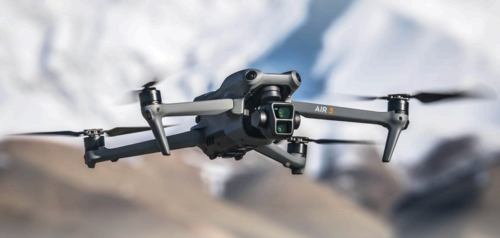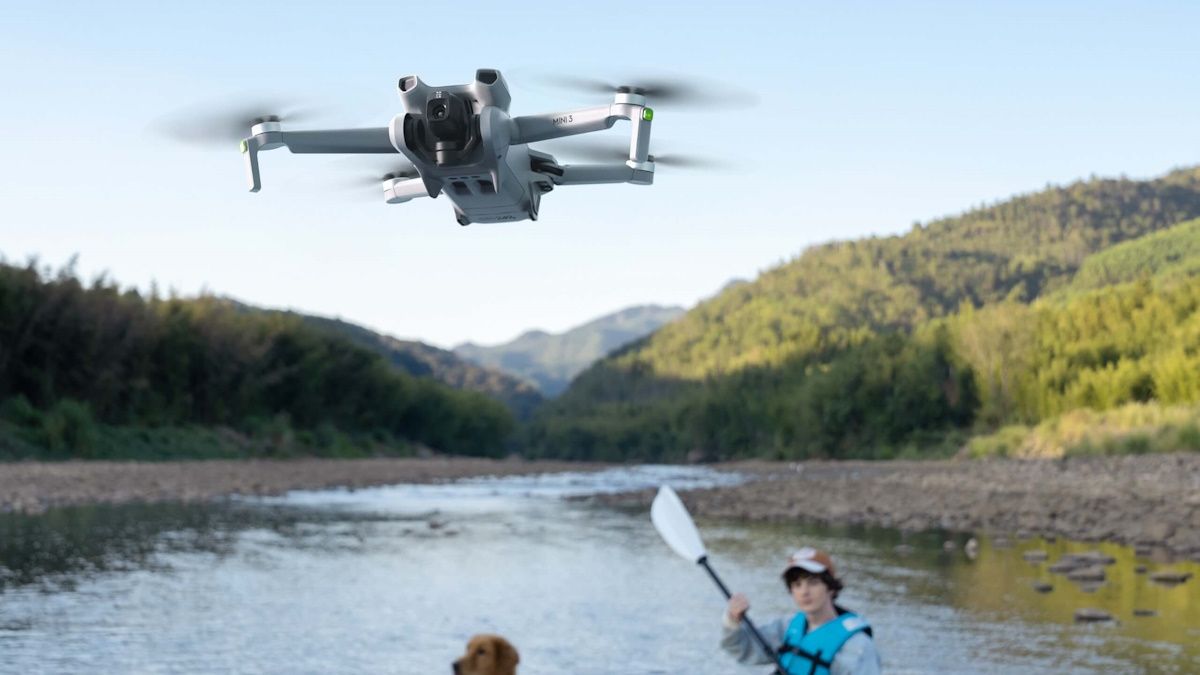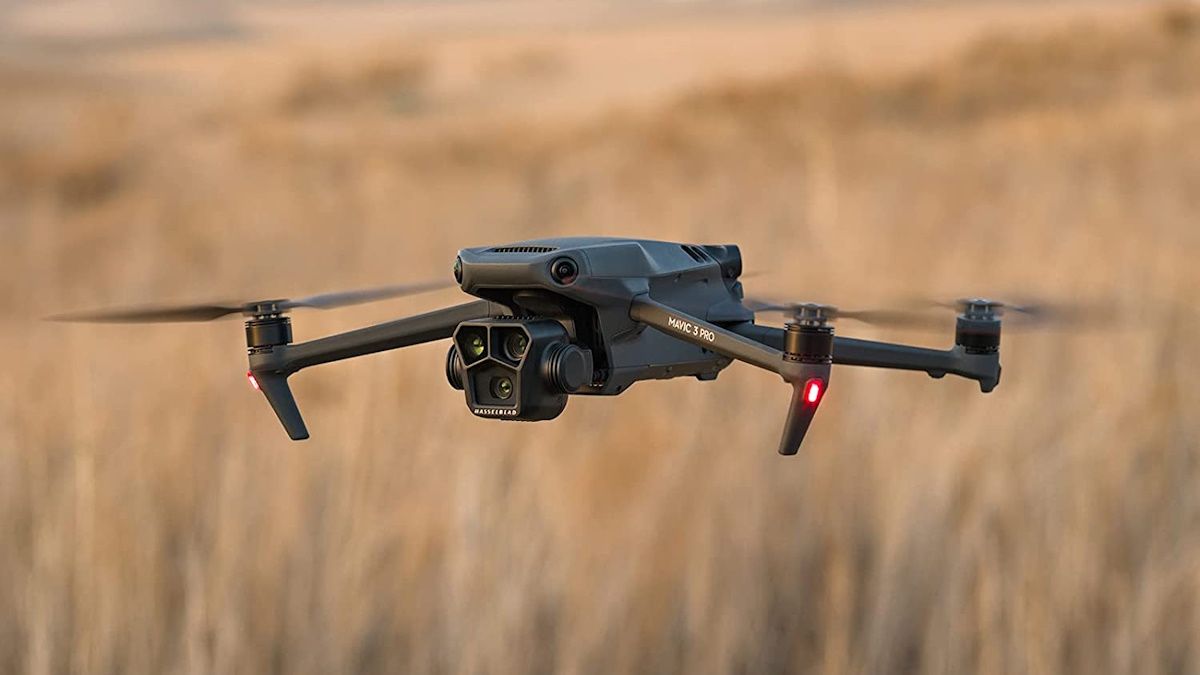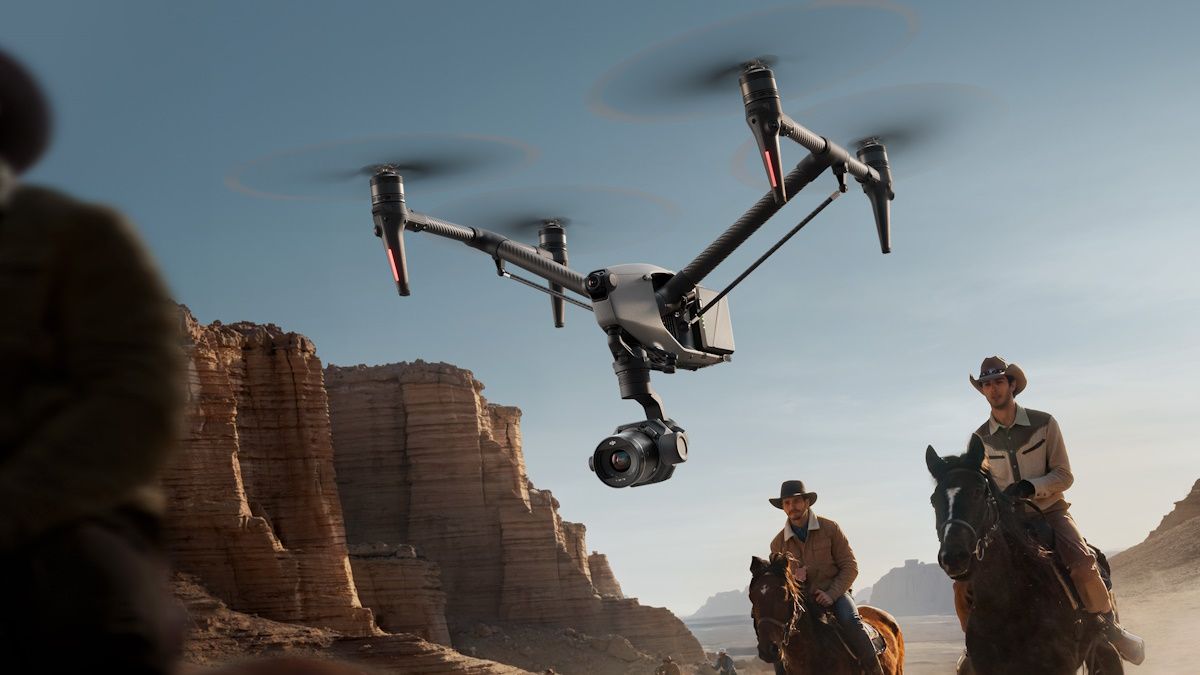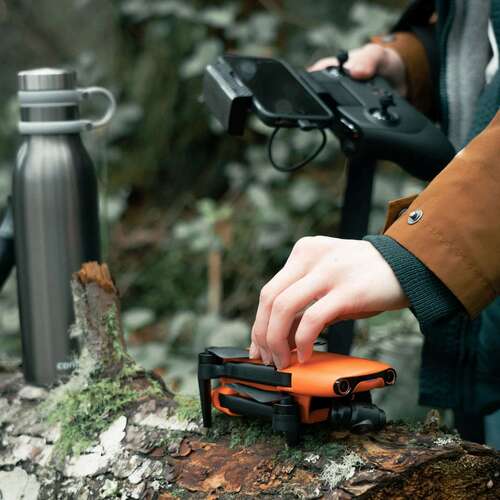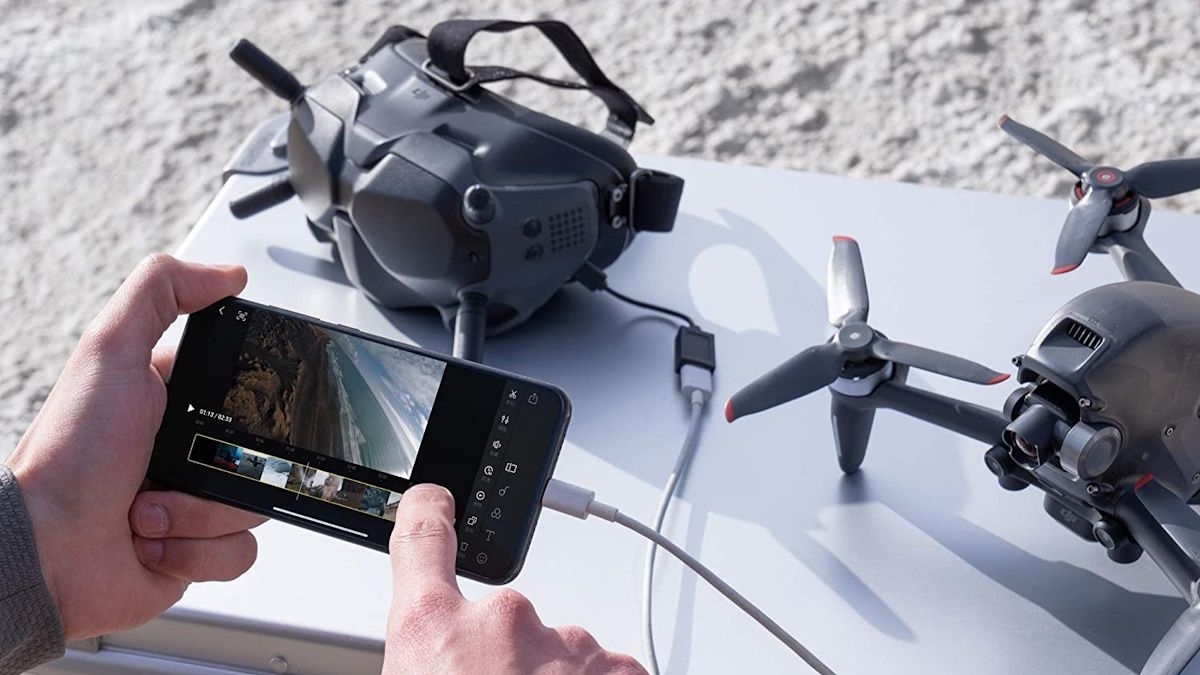Drones are both easy and fun to fly. They offer a new way to make content and explore the world. The only real problem is finding the right one to buy. Thankfully, we’re here to help!
UPDATE: 03/08/024
We’ve updated our buying guide with a variety of new drones. Take a look!
What to Look For in a Drone in 2024
While all multi-rotor drones are similar looking at first glance, there are significant differences under the hood. Thankfully, you only need to scrutinize a few key areas before settling on a purchase.
Let’s start with the drone’s camera. The same general rules apply here as with any digital camera purchase. Make sure you look for drones that offer the resolution and framerate you want—the better the picture and video you want to take, the better resolution and framerate you’re going to require. If you’re looking to do more professional work, it’s also worth noting if the drone can take RAW photos or videos that have a flat color grade so that they can be graded later.
Sensor size, aperture, and other features are also important if you plan on taking great pictures, but a lot of this requires knowing how photography works to make full sense of these specs. All of our drone recommendations specify their use case so you don’t have to worry too much about these aspects unless you’re a picture aficionado.
Next up is drone size and weight. Drones vary from tiny nano-drones that fit in your hand to massive flying machines that are powerful enough to haul cinema cameras into the air. What size of drone you’re happy with will depend entirely on your needs.
As a general rule, smaller drones won’t have the professional specs or features of larger ones, but you may be surprised at how good small drones have become. But it’s also important to keep in mind that in some countries, drones below a certain weight are exempt from licensing or registration. If you’re taking your drone abroad, be sure to look up the laws!
Flight performance and transmission technology are also central concerns. Drones that use standard WiFi connections have limited ranges and are more prone to interference, ruining your view. Proprietary systems usually perform better and reduce the chance that you’ll have a flyaway drone or lose contact.
You should also pay attention to how fast the drone can fly, what altitudes it can operate, and how much wind it can handle. If you buy a drone that can’t handle the environment you want to fly in, it’s just going to spend its time on the ground photographing the local insect life—if it doesn’t get broken entirely.
Finally, we have flight endurance, or essentially the drone’s battery life before it needs to return to home for a new battery. The latest drones are zeroing in on 30 minutes, but larger or older drones will offer less time in the air. You need to move out of the consumer drone space and into the professional realm if you want more, so expect 30 minutes to be about the limit.
With all this in mind, here are our best drone recommendations.
|
How Did We Research |
||
|
Models Evaluated |
Hours Researched |
Reviews Analyzed |
|
35 |
12 |
50 |
How-To Geek’s product recommendations come from the same team of experts that have helped people fix their gadgets over one billion times. We only recommend the best products based on our research and expertise. We never accept payment to endorse or review a product.
Read More »
Best Drone Overall: DJI Air 3
|
Pros |
Cons |
|---|---|
|
✓ Amazing price for what you get |
✗ Dual-camera systems adds complexity |
|
✓ Phenomenal flight time of 46 minutes |
✗ Not for those seeking ultimate image quality |
|
✓ Dual camera system |
|
|
✓ Omnidirectional object sensing |
The DJI Air 3 continues the Air-series’ tradition of being quality drones that are great for most people. While, by design, it will never match the image quality of high-end and professional-grade drones, it’s hard to imagine the vast majority of enthusiasts being disappointed with what the Air 3 brings to the table.
What’s always been great about the Air series of drones is that the fancy features introduced in the previous generation of expensive DJI drones trickle down to this more pocket-friendly model. So for just a little more than the asking price of the Air 2S, you get omnidirectional obstacle avoidance and an (optional) controller with a built-in screen, so you don’t need a phone anymore.
Not that there isn’t plenty of innovation to be had. The Air 3 has a novel dual-camera system that offers both a wide-angle lens and a more conventional 3x telephoto lens. It can use them together to create imagery that’s better than the sum of its parts and lets you frame more types of shots without the hassle of swapping out cameras as the pros do on their high-end machines.
On the technical side, things look great with 4K/60 video, 48MP photos, HDR video, and sophisticated abilities to fly and return home in case of an issue. Perhaps best of all, however, is the ludicrous flight time of up to 46 minutes. We were already blown away when the Air 2 hit the half-hour mark, but now there should be minimal battery anxiety.
Unless your needs are very modest (in which case the DJI Mini family is a better bet) we think the Air 3 is the right drone for most people, most of the time.
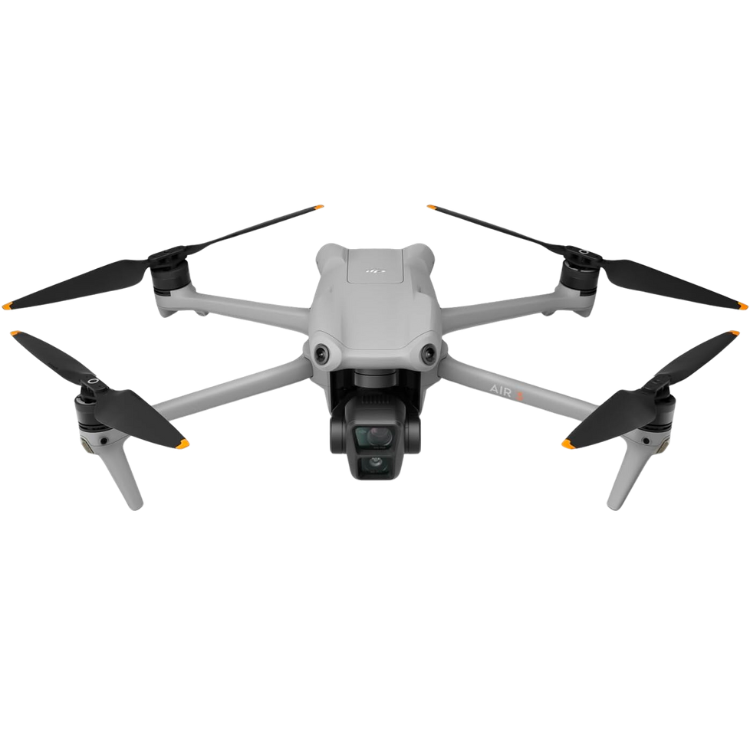

DJI Air 3
Best Overall Drone
The DJI 3 is the best drone in its price class, and makes it hard to justify spending a penny more for higher-end options unless you’re a true pro user.
|
Pros |
Cons |
|---|---|
|
✓ Featherweight and travel-friendly |
✗ Shorter range relative to pricier models |
|
✓ 4K camera supported by a 3-axis gimbal |
✗ Lack of professional-grade camera features |
|
✓ Extended flight time up to 38 minutes |
✗ No obstacle avoidance |
|
✗ Some countries now require registration even for Minis |
Shattering expectations and pushing boundaries, the DJI Mini 3 packs a technological wallop that leaves a lot of heavyweight drones on the ropes. Weighing in at just under 250 grams, this mini powerhouse is classified as a drone that needs no registration in many jurisdictions, sidestepping rigid flight regulations and granting you the freedom to roam the skies.
The ‘Mini’ prefix might suggest a lesser machine, but don’t be fooled. This little dynamo houses a 4K HDR camera steadied by a 3-axis gimbal, guaranteeing slick, cinematic footage. This drone is also capable of true vertical shooting.
The Mini 3 runs the gamut with an impressive flight time of up to 38 minutes, certainly enough to tour your local vistas, and swapping out batteries is a breeze. If you opt for an Intelligent Flight Battery Plus, you can extend that to 51 minutes.
In fairness, the compact and lightweight nature of the Mini 3 does lead to some compromises. It has a limited transmission distance of up to 10km, which, while significant, can’t compete with its higher-end siblings. Its 4K camera, though good, doesn’t offer the professional-grade features some advanced users might want, and its light frame can make handling in windy conditions a bit tricky, though the Mini 3 is rated for 10.7 m/s winds.
Despite these minor setbacks, the DJI Mini 3 proves a compelling option for anyone in the market for an economical drone that doesn’t skimp on features. We’d hesitate to recommend anything cheaper. If you want obstacle avoidance and a few other higher-spec features in a drone of this size class, consider the DJI Mini 3 Pro.
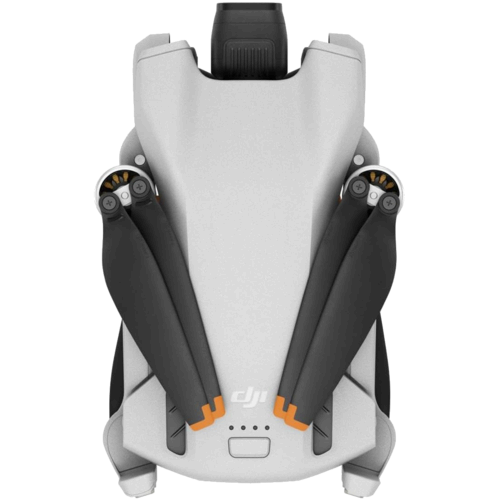

DJI Mini 3
Best Budget Drone
$469 $559 Save $90
It’s not the cheapest drone, but it’s the cheapest GOOD drone. The Mini 3 really makes you question whether buying a more expensive flying camera is worth it. Just don’t crash it, because there’s no obstacle avoidance!
|
Pros |
Cons |
|---|---|
|
✓ Triple-camera setup offering a range of focal lengths |
✗ High price tag |
|
✓ Professional-grade video capabilities |
✗ Potential complexity for casual users |
|
✓ Extended flight time up to 43 minutes |
✗ Less portable than smaller variants |
|
✓ 15km HD video transmission |
The DJI Mavic 3 Pro is the drone to beat for photography buffs looking to capture the world from a new perspective. This flying pro camera has features designed to elevate your aerial photography game.
The Mavic 3 Pro has a triple-camera setup. So whether you’re shooting sprawling landscapes or intimate close-ups, this drone can handle it all in a single flight.
But the Mavic 3 Pro isn’t just a one-trick pony; it’s also a video virtuoso, boasting pro-grade specs such as 5.1K/50fps and 4K/120fps video. Armed with these capabilities, you can craft cinematic content bound to drop jaws.
Further pushing the envelope, the Mavic 3 Pro also provides an extended flight time of up to 43 minutes and a 15km HD video transmission range, allowing for real-time, high-definition shot adjustments.
Of course, such state-of-the-art features come with a hefty price tag, potentially making the Mavic 3 Pro a pipe dream for hobbyists and newcomers. Additionally, the sheer complexity of its features may be daunting for casual users. And while it isn’t a behemoth, it certainly can’t match the portability of its diminutive relatives, the DJI Mini 3 and Mini 3 Pro.
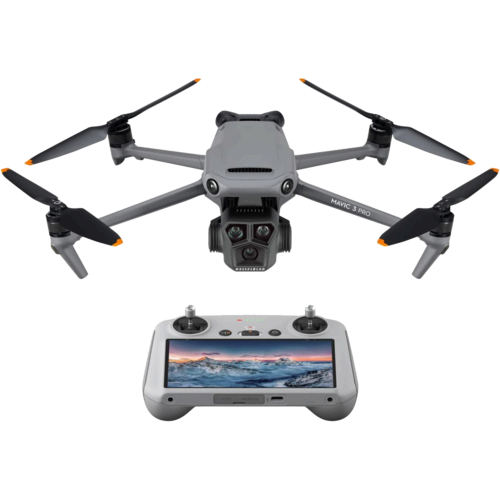

DJI Mavic 3 Pro with DJI RC
Best Photography Drone
This flagship drone from DJI shows why the company dominates the drone industry. It’s a bargain compared to proper industry professional drones, yet you’ll have no trouble making content you can sell with this little beast.
|
Pros |
Cons |
|---|---|
|
✓ Incredible 8K image quality |
✗ High price point |
|
✓ Superb flight speed and time for its class |
✗ Not for beginners |
|
✓ High-precision and stability in flight |
|
|
✓ Advanced intelligent flight modes |
|
|
✓ Comprehensive obstacle detection |
With its launch of the Inspire 3, DJI has truly upped its game for those who take their aerial cinematography seriously. As with all things DJI, there’s a definite wow factor here that isn’t just skin deep. This is a drone that packs in more than you could ask for and then some. The Inspire 3 is a cinematic beast, but it does not shy away from its professional ambitions.
Sure, you’re going to pay a pretty penny for it. Priced at over $16K, it’s not for the faint of heart. But the full-frame 8K Zenmuse X9-8K Air gimbal camera alone is a wonder, with its 8K/25fps CinemaDNG video and 8K/75fps Apple ProRes RAW video. The flight speed can hit up to 94km/h, thanks to a robust propulsion system. Even better, the TB51 intelligent dual batteries can keep it aloft for up to 28 minutes, which is no mean feat for a drone of this class.
DJI didn’t stop at just image quality and flight performance, though. The Inspire 3 incorporates high-precision RTK positioning technology and an integrated triple GNSS system for superior stability and precision. New Waypoint Pro intelligent flight modes and the Spotlight Pro feature bring a new level of sophistication to flight-route planning and object tracking. And if all that wasn’t enough, this drone has a whopping nine visual sensors to keep you from flying into trouble.
In a nutshell, the DJI Inspire 3 is the Rolls Royce of drones. It’s big, flashy, and packed with the best technology money can buy. This is the kit you’ve been waiting for those who want a drone that can capture unparalleled aerial shots and offer versatility like never before. It might take some getting used to, and you’ll need to dig deep into your wallet, but for the right customer, it’s worth every cent.
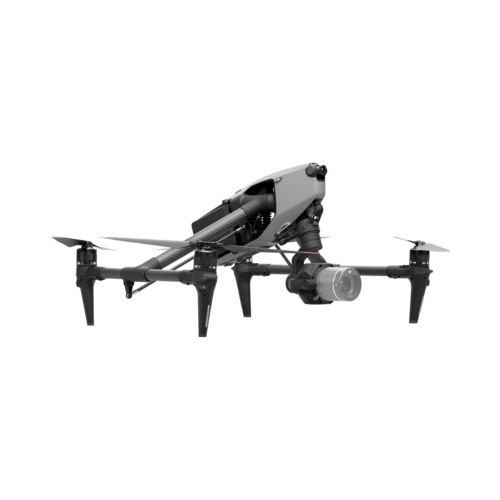

DJI Inspire 3
Best Video Drone
This is where professional drone cinematography starts. It might seem expensive, but compared to the next cheapest pro drone DJI are practically giving these away, and we’ve been waiting for a new Inspire for years.
|
Pros |
Cons |
|---|---|
|
✓ Sub-250g, 4K, 48MP drone |
✗ Price is a smidge high |
|
✓ 3-way obstacle avoidance |
✗ Middling flight times by current standards |
|
✓ High-visibility orange model is great for first time pilots who “lose” their drone |
The Autel EVO Nano+ is, in our opinion, the best drone for beginners because it’s designed to smooth over many of the initial stumbling blocks first-time drone owners face.
First, this is in the same size and weight class as the DJI Mini family of drones, so if you’re looking for a casual drone you can fly on holiday without needing a drone permit, this should be on the shortlist. Just keep in mind that not all countries have a drone registration exemption for drones under 250g.
The EVO has three-way obstacle avoidance, which is still relatively rare in drones of this size class. It’s cheaper than the latest DJI Mini Pro 4 or even the DJI Air 3. At launch in 2022, the Nano+ was priced much higher, but since then it’s been cut down significantly both in its standalone and premium bundle forms.
Given that reduction in price and its overall mix of features, we think it’s the best choice for beginners, especially the bright orange option, which makes it easier to find in the event of a crash. However, if money is no object, more expensive drones such as the Air 3 are generally beginner-friendly too.
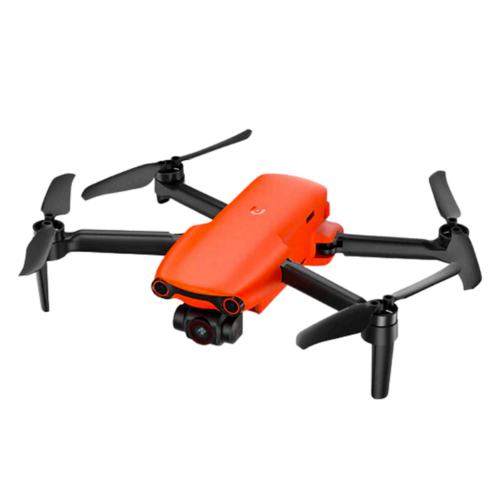

Autel Robotics EVO Nano+
Best Drone for Beginners
The Autel Robotics EVO Nano+ has received a price reduction which makes it appealing to beginners who want to benefit from advanced obstacle avoidance and having a camera that produces excellent vide oand photos.
Best Racing Drone: DJI FPV
|
Pros |
Cons |
|---|---|
|
✓ Offers a gentle learning curve |
✗ While very fast, the FPV isn’t as fast or light as typical racing drones |
|
✓ No assembly required |
✗ The optional motion controller is a little gimmicky |
|
✓ Better video transmission than any other racing or FPV drone |
✗ Generally not suitable for official competitive use |
|
✓ Can actually create great footage |
Drone racing is a growing sport that’s still quite a niche, and so there aren’t many mainstream products that really fall neatly into the category. At this point, if you actually want to race drones competitively, you’re much better off buying or building a custom racing drone. But if all you want is to satiate the need for speed and feel like Superman tearing around the sky, then what you want is the DJI FPV.
While it’s not the fastest or most maneuverable FPV (First-Person View) drone you can buy, the DJI FPV is the most polished and complete product in this category. DJI has offered FPV experiences using headsets before, but sadly support for the DJI Goggles was dropped and are no longer in production. So if you want the immersive drone experience, the DJI FPV is the official answer from the company.
The FPV is an amazing machine with a properly good 4K, 60fps camera, cutting-edge low-latency video transmission technology, and an option motion controller. There’s really nothing quite like it! This DJI drone represents the next generation of FPV drone flight and offers a new way to create drone content. FPV footage and the sorts of shots you can get with the FPV range from difficult to impossible with more traditional camera drones.
DJI has gone a long way to ensure you don’t trash your expensive drone out on your first flight, too. It has automated protection systems, an emergency brake, and a hover feature.
While the FPV may not be as fast as the most barebones carbon fiber custom racer, it’s about twice as fast as a Mavic 2 Pro with superior wind resistance. So, despite all the safety nets DJI has included, you can still easily wreck it if you’re not careful. But if you’re a solid pilot and want to take your drone content to the next level, the FPV is the drone to get.
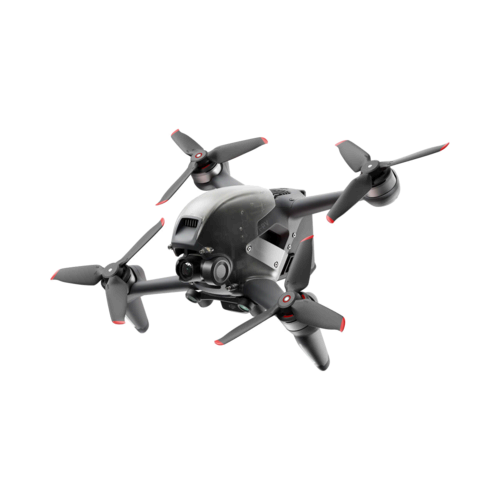

DJI FPV
Best Racing Drone
The DJI FPV is the only properly polished first-person view racing drone on the market today. It requires no assembly and offers massive speeds and crystal clear video transmission to your headset.
